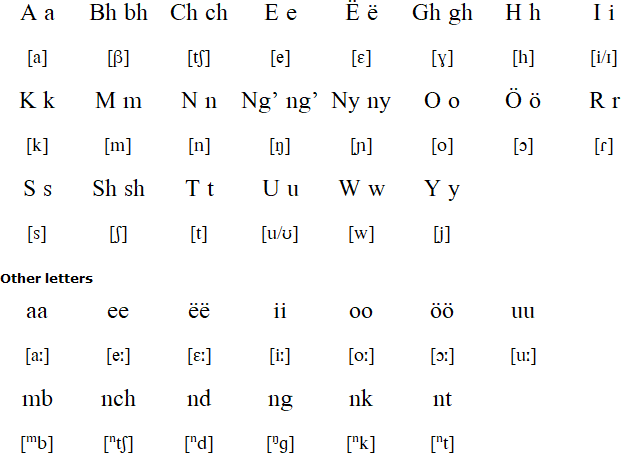Ikoma is a Northeast Bantu language spoken by about 36,000 people in the Serengeti District of the Mara Region on the south shore of Lake Victoria in northern Tanzania. In particular, it is spoken in the villages of Robanda, Burunga, Nyichoka and Mugumu.
The Ikoma, Nata and Isenye are separate ethnic groups who speak closely related languages known collectively as Ikoma or Ikoma-Nata-Isenye. A way to write Ikoma with the Latin alphabet was developed by SIL linguists and Ikoma Bible translators in the early 21st century. The same alphabet is used for Nata and Isenye.

Ikoma has a high and a low tone. These are not usually marked in writing.
Download an alphabet chart for Ikoma (Excel)
Source: https://www.bible.com/bible/3274/LUK.11.NTK
Source: https://www.bible.com/bible/1/LUK.11.KJV
Information about Ikoma
https://en.wikipedia.org/wiki/Ikoma_language
https://www.sil.org/resources/search/language/ntk
http://www.language-archives.org/language/ntk
Aka, Bafaw-Balong, Bangi, Basaa, Bemba, Bembe, Bena, Benga, Bhaca, Bube, Bukusu, Bulu, Central Teke, Chichewa, Chokwe, Chuwabu, Comorian, Dciriku, Digo, Duala, Eton, Ewondo, Fang, Ganda/Luganda, Gogo, Gusii, Gwere, Haya, Hehe, Herero, Ibinda, Ikizu, Ikoma, Jita, Kabwa, Kako, Kamba, Kiga, Kikuyu, Kimbundu, Kinyarwanda, Kirundi, Kisi, Kogo, Komo, Kongo, Konjo, Koti, Kukuya, Kunda, Kuria, Kwambi, Lambya, Lingala, Loma, Lozi, Luba-Katanga, Luchazi, Lunda, Luvale, Luyana, Makaa, Makonde, Makhuwa, Mandekan, Maore, Masaaba, Mbama, Mbere, Mbukushu, Mbunda, Mbuun, Mende, Mongo, Mpiemo, Mushungulu, Mwani, Nambya, Nande, Ngoni, Nkore, North Teke, Northern Ndebele (South Africa), Northern Ndebele (Zimbabwe), Northern Sotho, Nyamwezi, Nyakyusa, Nyemba, Nyole, Nyoro, Nyungwe, Nzadi, Oroko, OshiWambo, Pagibete, Punu, Ronga, Safwa, Sena, Sengele, Shona, Soga, Songe, Southern Ndebele, Southern Sotho, Sukuma, Swahili, Swati, Tanga, Tembo, Tonga, Tooro, Tshiluba, Tsonga, Tswa, Tswana, Tumbuka, Umbundu, Venda, Vili, Vwanji, Xhosa, Yakam, Yansi, Yao, Yasa, Yeyi, Zigula, Zinza, Zulu
Languages written with the Latin alphabet
Page created: 04.11.24. Last modified: 04.11.24
[top]
You can support this site by Buying Me A Coffee, and if you like what you see on this page, you can use the buttons below to share it with people you know.

If you like this site and find it useful, you can support it by making a donation via PayPal or Patreon, or by contributing in other ways. Omniglot is how I make my living.
Note: all links on this site to Amazon.com, Amazon.co.uk
and Amazon.fr
are affiliate links. This means I earn a commission if you click on any of them and buy something. So by clicking on these links you can help to support this site.
[top]